Rhöndorf Edition
Central papers from Konrad Adenauer’s estate and other collections are published in the Rhöndorf Edition ("Rhöndorfer Ausgabe"). A comprehensive commentary provides help in understanding the content, but does not anticipate the interpretation of the documents. Rather, the publication is intended to make the material accessible for further use in a scientifically validated form. It is an indispensable basis for the source-based study of Adenauer and his politics.
Since 1983, twenty volumes have been published in the series, covering Adenauer’s letters, his “tea talks” with journalists and other individual topics. Further publications are in the pipeline. The editors are Stefan Creuzberger (University of Rostock) and Dominik Geppert (University of Potsdam).
The Rhöndorf Edition is currently being prepared in online format. More on this soon at www.konrad-adenauer.de
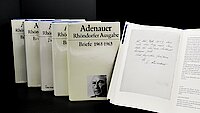
Letters
The edited collection of letters comprises a selection of around 4,200 Adenauer letters from the period 1945 to 1967, reflecting the personality of the author - clearly in structure, direct in address and often cutting in tone. They deal with a wealth of foreign and domestic issues, but also provide information on Adenauer’s style of government and the realisation of his political claim to power.
Rudolf Morsey/Hans-Peter Schwarz (Hg.)
Adenauer. Rhöndorfer Ausgabe. Briefe
Bearbeitet von Hans Peter Mensing
- Briefe 1945–1947, Berlin (Siedler) 1983
- Briefe 1947–1949, Berlin (Siedler) 1984
- Briefe 1949–1951, Berlin (Siedler) 1985
- Briefe 1951–1953, Berlin (Siedler) 1987
- Briefe 1953–1955, Berlin (Siedler) 1995
- Briefe 1955–1957, Berlin (Siedler) 1998
- Briefe 1957–1959, Paderborn (Ferdinand Schöningh) 2000
- Briefe 1959–1961, Paderborn (Ferdinand Schöningh) 2004
- Briefe 1961–1963, Paderborn (Ferdinand Schöningh) 2006
Die letzten Lebensjahre 1963–1967. Briefe und Aufzeichnungen, Gespräche, Interviews und Reden, Bd. I: Oktober 1963–September 1965, Bd. II: September 1965–April 1967, Paderborn (Ferdinand Schöningh) 2009
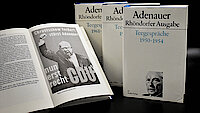
Tea talks
At irregular intervals, Adenauer invited selected journalists to a tea party in the Chancellery in order to discuss current issues. As confidentiality was maintained, he was remarkably open in his comments. The 162 minutes and recordings of the “tea talks” ("Teegespräche") from 1950 to 1963 are therefore a valuable source not only for Adenauer’s media policy, but also for his political concepts as a whole.
Rudolf Morsey/Hans-Peter Schwarz (Hg.)
Adenauer. Rhöndorfer Ausgabe. Teegespräche
Bearbeitet von Hanns Jürgen Küsters (1950–1954, 1955–1958, 1959–1961) und Hans Peter Mensing (1961–1963)
- Teegespräche 1950–1954, Berlin (Siedler) 1984
- Teegespräche 1955–1958, Berlin (Siedler) 1986
- Teegespräche 1959–1961, Berlin (Siedler) 1988
- Teegespräche 1961–1963, Berlin (Siedler) 1992
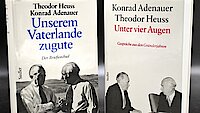
Konrad Adenauer and Theodor Heuss
When he left office in 1959, the first Federal President Theodor Heuss paid tribute to the first Federal Chancellor Konrad Adenauer as a “travelling companion” through “ten fateful years”. Their correspondence and the records of their conversations in the office of the Federal President document the dialogue between two “founding fathers” of West German post-war democracy, who were politically and - despite the necessary distance - also personally connected.
- Rudolf Morsey/Hans-Peter Schwarz (Hg.)
Adenauer. Rhöndorfer Ausgabe. Heuss–Adenauer. Unserem Vaterland zugute. Der Briefwechsel 1948–1963
Bearbeitet von Hans Peter Mensing
Berlin (Siedler) 1989 - Rudolf Morsey/Hans-Peter Schwarz (Hg.)
Adenauer. Rhöndorfer Ausgabe. Adenauer–Heuss. Unter vier Augen. Gespräche aus den Gründerjahren 1949–1959
Bearbeitet von Hans Peter Mensing
Berlin (Siedler) 1997
Adenauer in the Third Reich
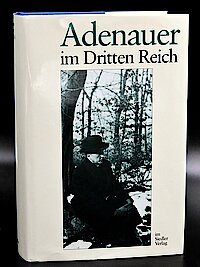
With this volume, the Rhöndorf Edition makes Adenauer’s life under the National Socialist dictatorship accessible. Letters, notes and diary entries guide us through the years of uncertainty from 1933 to 1945. By the end of this oppressive period Adenauer had recognised his political mission to “educate the Germans for peace from the ground up”.
- Rudolf Morsey/Hans-Peter Schwarz (Hg.)
Adenauer. Rhöndorfer Ausgabe. Adenauer im Dritten Reich
Bearbeitet von Hans Peter Mensing
Berlin (Siedler) 1991
Adenauer and the FDP
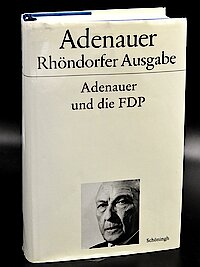
Education, management and crises of the conservative-liberal coalitions under Adenauer are the focus of this thematic volume. It contain correspondence with the leading FDP politicians, minutes of coalition talks and records of coalition negotiations. For a long time, the Chancellor set the direction in everyday government life and, if necessary, enforced his political will with rigour. Later, he had to take the interests of the coalition partners much more into consideration. When Adenauer stepped down in 1963, the Federal Republic had changed from a “chancellor democracy” to a coalition or party democracy”.
- Rudolf Morsey/Hans-Peter Schwarz (Hg.)
Adenauer. Rhöndorfer Ausgabe. Adenauer und die FDP
Bearbeitet von Holger Löttel
Paderborn (Ferdinand Schöningh) 2013
Konrad Adenauer, Ludwig Erhard and the social market economy
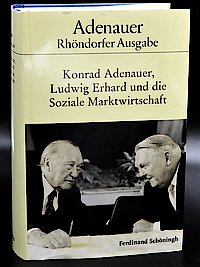
Ludwig Erhard is generally regarded as the “father” of the social market economy. However, Adenauer also played his part in setting the course of economic policy in the early years. It was he who helped Erhard achieve his breakthrough in 1949. In the years that followed, the two maintained an intense - often controversial - exchange on economic matters, which is documented here in letters, memoranda and recorded conversations. The perspective of Adenauer and Erhard shows how the concept of the social market economy was negotiated in political practice.
- Dominik Geppert/Hans-Peter Schwarz (Hg.)
Adenauer. Rhöndorfer Ausgabe. Konrad Adenauer, Ludwig Erhard und die Soziale Marktwirtschaft
Bearbeitet von Holger Löttel
Paderborn (Ferdinand Schöningh) 2019